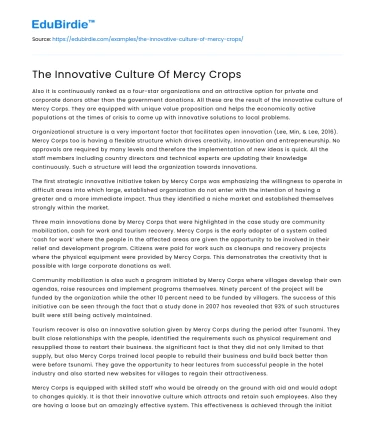Also it is continuously ranked as a four-star organizations and an attractive option for private and corporate donors other than the government donations. All these are the result of the innovative culture of Mercy Corps. They are equipped with unique value proposition and helps the economically active populations at the times of crisis to come up with innovative solutions to local problems.
Organizational structure is a very important factor that facilitates open innovation (Lee, Min, & Lee, 2016). Mercy Corps too is having a flexible structure which drives creativity, innovation and entrepreneurship. No approvals are required by many levels and therefore the implementation of new ideas is quick. All the staff members including country directors and technical experts are updating their knowledge continuously. Such a structure will lead the organization towards innovations.
Save your time!
We can take care of your essay
- Proper editing and formatting
- Free revision, title page, and bibliography
- Flexible prices and money-back guarantee
The first strategic innovative initiative taken by Mercy Corps was emphasizing the willingness to operate in difficult areas into which large, established organization do not enter with the intention of having a greater and a more immediate impact. Thus they identified a niche market and established themselves strongly within the market.
Three main innovations done by Mercy Corps that were highlighted in the case study are community mobilization, cash for work and tourism recovery. Mercy Corps is the early adopter of a system called ‘cash for work’ where the people in the affected areas are given the opportunity to be involved in their relief and development program. Citizens were paid for work such as cleanups and recovery projects where the physical equipment were provided by Mercy Corps. This demonstrates the creativity that is possible with large corporate donations as well.
Community mobilization is also such a program initiated by Mercy Corps where villages develop their own agendas, raise resources and implement programs themselves. Ninety percent of the project will be funded by the organization while the other 10 percent need to be funded by villagers. The success of this initiative can be seen through the fact that a study done in 2007 has revealed that 93% of such structures built were still being actively maintained.
Tourism recover is also an innovative solution given by Mercy Corps during the period after Tsunami. They built close relationships with the people, identified the requirements such as physical requirement and resupplied those to restart their business. the significant fact is that they did not only limited to that supply, but also Mercy Corps trained local people to rebuild their business and build back better than were before tsunami. They gave the opportunity to hear lectures from successful people in the hotel industry and also started new websites for villages to regain their attractiveness.
Mercy Corps is equipped with skilled staff who would be already on the ground with aid and would adopt to changes quickly. It is that their innovative culture which attracts and retain such employees. Also they are having a loose but an amazingly effective system. This effectiveness is achieved through the initiative that the looseness allows. This kind of a flexible and effective system plays a vital role in enhancing and encouraging innovation.
Mercy Corps also has taken several measures to increase and maintain the innovations among the fieldworkers within the organization. One of such programs is the Phoenix Fund launched in 2004 to finance start-up businesses in countries recovering from war. Other one was an internal innovation competition started in 2004 for publicizing creative work happening through out the organization. This encouraged information sharing and learning across branches around the world about innovations done by various field workers.






 Stuck on your essay?
Stuck on your essay?

